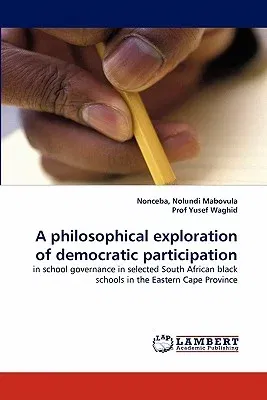Nonceba Nolundi Mabovula
(Author)A Philosophical Exploration of Democratic ParticipationPaperback, 18 February 2011

Qty
1
Turbo
Ships in 2 - 3 days
In Stock
Free Delivery
Cash on Delivery
15 Days
Free Returns
Secure Checkout
Print Length
424 pages
Language
English
Publisher
LAP Lambert Academic Publishing
Date Published
18 Feb 2011
ISBN-10
3844305505
ISBN-13
9783844305500
Description
Product Details
Book Format:
Paperback
Country of Origin:
US
Date Published:
18 February 2011
Dimensions:
22.86 x
15.24 x
2.39 cm
ISBN-10:
3844305505
ISBN-13:
9783844305500
Language:
English
Location:
Saarbrucken
Pages:
424
Publisher:
Weight:
616.89 gm

